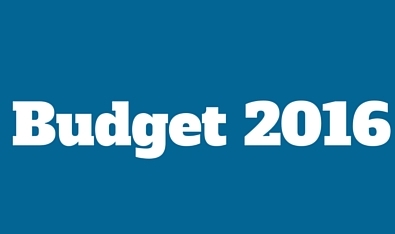 100% Deduction of Profits for 3 out of 5 Years for Start-Ups withdrawal upto 40% of the Corpus to be Tax-Free at the time of Retirement
100% Deduction of Profits for 3 out of 5 Years for Start-Ups withdrawal upto 40% of the Corpus to be Tax-Free at the time of Retirement
Deduction of Additional Interest of Rs.50,000 Per Annum for First-Time Home buyers
New Dispute Resolution Scheme to be Introduced
Thirteen Cesses Levied by Various Ministries having Revenue Collection less than Rs.50 Crore to be Abolished
�E-Sahyog� and �E-Assessment� to be Expanded Further
100% Deductions for Profits to an undertaking in Housing Project for Flats up to 30 Sq. Mtrs.
The Union Finance Minister Shri Arun Jaitley said that taxation is a major tool available to government for removing poverty and inequality from the society. He enlisted 09 categories of thrust in his text proposals which include (1) Relief to small tax payers (2) Measures to boost growth and employment generation (3) Incentivizing domestic value addition to help Make in India (4) Measures for moving towards a pensioned society (5) Measures for promoting affordable housing (6) Additional resource mobilization for agriculture, rural economy and clean environment (7) Reducing litigation and providing certainty in taxation (8) Simplification and rationalization of taxation (9) Use of technology for creating accountability.
Announcing relief to small tax payers Shri Jaitley proposed to raise the ceiling of tax rebate U/s. 87A from Rs.2000 to Rs.5000. With this, individuals having income up to Rs.5 lakh will get a relief of Rs.3000 in their tax liability. He also proposed to increase the limit of deduction of rent paid U/s.80 GG from Rs.24,000 per annum to Rs.60,000 to provide relief to those who live in rented houses. Shri Jaitley proposed to increase the turnover limit under presumptive taxation scheme U/s.44 AD of the Income Tax Act to Rs.2 Crores from existing limit of Rs.1 Crore which will benefit more than 30 lakh small business people. He also proposed to extend the presumptive taxation scheme with profit deemed to be 50%, to professionals with gross receipts up to Rs.50 lakh.
Announcing the measures to boost growth and employment generation Shri Arun Jaitley said that the accelerated depreciation provided under IT Act will be limited to maximum 40% from 1st April 2017. The benefit of deductions for research would be limited to 150% from 1st April 2017 and 100% from 1st April 2020. The benefit of Section 10-AA to new SEZ units will be available to those units which commence activity before 31st March 2020. The weighted deduction U/s.35-CCD for skill development will continue up to 1st April 2020, Shri Jaitley said.
Announcing Corporate Tax proposals Shri Arun Jaitley said that new manufacturing companies incorporated on or after 1st March 2016 will be given an option to be taxed at 25% + Surcharge and Cess provided they do not claim profit- linked or investment-linked deductions and do not avail of investment allowance and accelerated depreciation. He further proposed to lower the Corporate Tax rate for the next financial year for relatively small enterprises i.e., companies with turnover not exceeding Rs.5 crore (in the financial year ending March 15), to 29% +Surcharge and Cess.
Recognizing the importance of start-ups in employment generation and as key partners in Make in India programme, Shri Jaitley proposed 100% deduction of profits for three out of five years for start-ups set up during April 2016 to March 2019 entailing MAT liability. He also proposed 10 per cent rate of tax on income from worldwide exploitation of patents, developed and registered in India by a resident. In order to get more investment in Asset Reconstruction Companies (ARCs) he proposed complete pass through of Income Tax to securitization trusts including trusts of ARCs. Securitization Trusts will be liable to deduct tax at source. Period for getting benefit of long term Capital Gain regime in case of unlisted companies will be reduced from 3 to 2 years. Non-banking financial companies shall be eligible for deduction to the extent of 5% of its income in respect of provision for bad and doubtful debts. Shri Jaitley said that determination of residency of foreign company on the basis of place of effective management (POEM) will be deferred by one year and reiterated commitment to implement General Anti Avoidance Rules (GAARs). He further proposed exemption of Service Tax on services provided under Deen Dayal Upadhyay Gramin Kaushalya Yojana and services provided by assessing bodies empanelled by Ministry of Skill Development and Entrepreneurship. He also announced exemption of Service Tax on general insurance services provided under Niramaya Health Insurance Scheme launched by National Trust for the Welfare of Persons with Autism, Cerebral Palsy, Mental Retardation and Multiple Disability. Shri Jaitley also announced reduction of basic custom and excise duty on refrigerated containers to 5% and 6% respectively.
To promote Make in India campaign of the Government Shri Arun Jaitley proposed changes in Customs and Excise Duty rates on certain inputs to reduce costs and improve competitiveness of domestic industry in sectors like Information Technology Hardware, Capital Goods, Defence Production, Textiles, Mineral Fuels and Mineral Oils, Chemicals and Petrochemicals, Paper, Paperboard and Newsprint, Maintenance Repair and Overhauling (MRO) of aircraft and ship repair.
Announcing measures for pensioners Shri Arun Jaitley said that withdrawal up to 40% of the corpus at the time of retirement will be tax exempt in the case of National Pension Scheme (NPS). Annuity Fund which goes to legal heir will not be taxable. In case of superannuation funds and recognized provident funds, including EPF, the same norm of 40% of corpus to be tax free will apply in respect of corpus created out of contributions made on or from 1st April 2016. Shri Jaitley also proposed limit for contribution of employer in recognized provident and superannuation fund of Rs.1.5 lakh per annum for taking tax benefit. Exemption from Service Tax for annuity services provided by NPS and services provided by EPFO to employees will be given. He also announced reduction of Service Tax on single premium annuity (Insurance Policies) from 3.5% to 1.4% of the premium paid in certain cases.
To address the housing needs of all and more specifically the poor, in a time-bound manner, Shri Arun Jaitley announced 100% deduction for profits to an undertaking in housing project for flats up to 30 sq mtrs. in four metro cities and 60 sq. mtrs. in other cities, approved during June 2016 to March 2019 and completed in three years. However, Minimum Alternate Tax (MAT) will be applicable. The Finance Minister announced deduction for additional interests of Rs.50,000 per annum for loans up to Rs.35 lakh sanctioned in 2016-17 for first time home buyers, where house costs does not exceed Rs.50 lakh. He also proposed that distribution made out of income of SPV to the REITs and INVITs having specified shareholding will not be subjected to Dividend Distribution Tax (DDT), in respect of dividend distributed after the specified date. Shri Jaitley also proposed to exempt Service Tax on construction of affordable housing up to 60 sq. mtrs. under any scheme of the Central or State Government including PPP Schemes. He also proposed Excise Duty exemption presently available to concrete mix manufactured at site for use in construction work to ready-mix concrete.
Announcing resource mobilization measures for agriculture, rural economy and clean environment Shri Jaitley said that additional tax @ 10% of gross amount of dividend will be payable by the recipients receiving dividends in excess of Rs.10 lakh per annum. Surcharge will be raised from 12% to 15% on persons, other than companies, firms and cooperative societies having income above Rs.1 Crore, he said. Shri Jaitley said that tax will be deducted at source @ 1% on purchase of luxury cars exceeding value of Rs.10 lakh and purchase of goods and services in cash exceeding Rs.2 lakh. He proposed to increase security transaction tax in case of �Options� from 0.017 to 0.05 per cent. Equalization levy of 6% of gross amount for payment made to non-residents exceeding Rs.1 lakh a year in case of B2B transactions was also proposed. He further proposed Krishi Kalyan Cess @ 0.5% on all taxable services w.e.f. 1st June 2016. Proceeds from this would be exclusively used for financing initiatives for improvement of agriculture and welfare of farmers, he said.
Expressing concern over pollution and traffic situation in Indian cities, Shri Jaitley proposed an Infrastructure Cess of 1% of small petrol, LPG, CNG cars; 2.5% on Diesel Cars of certain capacity and 4% on other higher engine capacity vehicles and SUVs. No credit of this Cess will be available nor credit of any other tax or duty be utilized for paying the Cess, he said. Shri Jaitley also proposed levy of Excise Duty of �1% without input tax credit or 12.5% with input tax credit� on articles of jewellery (excluding silver jewellery, other than studded with diamonds and some other precious stones), with a higher exemption and eligibility limits of Rs.6 Crore and 12 Crore respectively. The Finance Minister further proposed to raise Excise Duty on ready-made garments with retail price of Rs.1,000 or more to 2% without input tax credit or 12.5% with input tax credit. He also proposed to increase Clean Environment Cess on coal, lignite and peat from Rs.200 per tonne to Rs.400 per tonne. Excise Duty on various tobacco products other than bidi was also proposed to be raised by about 10 to 15%. Proposing amendment to Finance Act 1994 he said that assignment of right to use the spectrum and its subsequent transfers will be a service leviable to Service Tax and not sale of intangible tax.
Highlighting Government�s priority towards a lower tax regime with non-litigious approach the Finance Minister desired to give an opportunity to the earlier non-compliant to move to the category of compliant. He reiterated government�s commitment to provide a stable and predictable taxation regime and reduce black money. Shri Arun Jaitley announced that domestic tax payers can declare undisclosed income or such income represented in the form of any asset by paying tax at 30%, and surcharge at 7.5% and penalty at 7.5%, which is a total of 45% of the undisclosed income. Such declarants will have immunity from prosecution. He said that Surcharge levied at 7.5% of undisclosed income will be called Krishi Kalyan Surcharge to be used for agriculture and rural economy. Announcing New Dispute Resolution Scheme he said that no penalty will be charged in respect of cases with disputed tax up to Rs.10 lakh. Cases with disputed tax exceeding Rs.10 lakh will be subjected to 25% of the minimum of the imposable penalty. Any pending appeal against a penalty order can also be settled by paying 25% of the minimum of the imposable penalty and tax interest on quantum addition, he said. Shri Jaitley announced a High Level Committee chaired by Revenue Secretary to oversee fresh cases where Assessing Officer applied the retrospective amendment. In case of mis-reporting of facts, the Finance Minister proposed penalty rates of 200% of tax and 50% penalty in case of under-reporting of income. He said this allowance will be limited to 1% of the average monthly value of investments yielding exempt income, but not exceeding the actual expenditure claimed under Rule �AD of Section -14A of Income Tax Act. There will be a time limit of one year for disposing petitions of the tax-payers seeking waiver of interest and penalty. It will be mandatory for the Assessing Officer to grant stay of demand once the assessee pays 15% of the disputed demand while the appeal is pending before Commissioner of Income Tax (Appeals). Shri Jaitley said that the monetary limit for deciding an appeal by a single member Bench of ITAT will be enhanced from Rs.15 lakh to Rs.50 lakh. He also announced creation of 11 new Benches of Customs, Excise and Service Tax, Appellate Tribunal (CESTAT) to remove backlog of cases.
Stressing on simplification and rationalization of taxation the Finance Minister said that 13 cesses, levied by various Ministries in which revenue collection is less than Rs.50 Crore, will be abolished. For non residents providing alternative documents to PAN Card will be allowed and TDS provisions for Income Tax will be rationalized. Facility for revision of return will also be extended to Central Excise Assesses. With respect to non-taxable services for reversal of input tax credits, additional options to banking companies and financial institutions, including NBFCs will be provided. Exporters and importers with proven track record will be extended the facility for deferred payment of customs duties. At major ports and airports starting from next financial year customs single window project will be implemented. Shri Jaitley also announced increase in free baggage allowance for international passengers. Filing of baggage declaration will be required only for those carrying dutiable goods.
Emphasizing use of technology in taxation department in a big way to make life simpler for a law-abiding citizen. Shri Arun Jaitley announced expansion in the scope of e-Assessment to all assesses in seven mega cities in the coming years. Interest @ 9% per annum against normal rate of 6% per annum for delay in giving effect to Appellate Order beyond 90 days will be chargeable. To reduce compliance cost especially for small tax payers �e-Sahyog� will be expanded, he said. Shri Jaitley said that direct tax proposals would result in revenue loss of Rs.1060 Crore and indirect proposals are expected to yield Rs.20670 Crore which means a revenue gain of Rs.19610 Crore. The Finance Minister said that government have a desire to provide socio-economic security to every Indian, especially the farmers, the poor and the vulnerable; a dream to see a more prosperous India; and a vision to �Transform India�.












